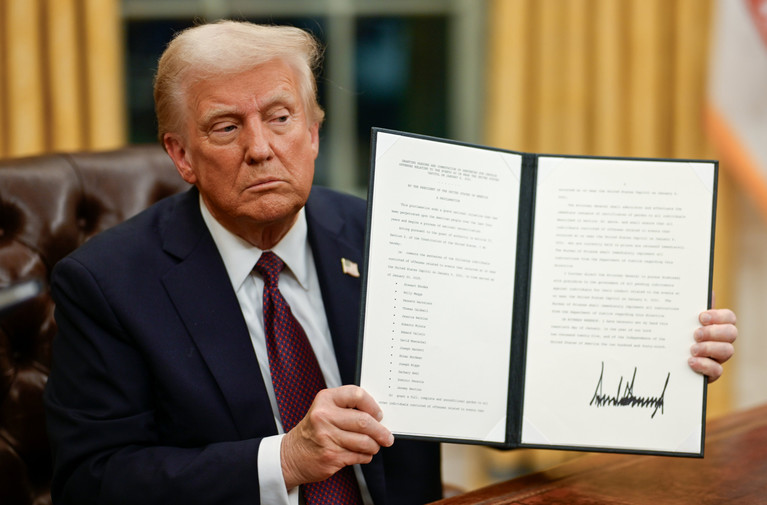No Confirmation on Whether Trump Has Filed His Last Executive Order Against Law Firms
Washington, D.C. – August 12, 2025
President Donald Trump’s series of executive orders targeting prominent U.S. law firms has sparked intense debate and legal challenges, but there is no definitive evidence as of August 12, 2025, to confirm whether he has issued his final order in this controversial campaign. Since February 2025, Trump has issued executive orders and memoranda against at least six law firms—Covington & Burling, Perkins Coie, Paul, Weiss, Rifkind, Wharton & Garrison, Jenner & Block, WilmerHale, and Susman Godfrey—primarily for their roles in representing clients or attorneys involved in investigations or litigation against him or his allies. These actions have raised alarms about their impact on the rule of law, with critics labeling them as retaliatory and unconstitutional.
Timeline of Executive Orders
The campaign began on February 25, 2025, with a presidential memorandum targeting Covington & Burling, suspending security clearances for its lawyers, including Peter Koski, who represented former special counsel Jack Smith. On March 6, Trump issued Executive Order 14230 against Perkins Coie, citing its work with Hillary Clinton’s 2016 campaign and the Steele dossier, suspending security clearances and restricting federal contracts. Subsequent orders targeted Paul Weiss (March 14), Jenner & Block (March 25), WilmerHale (March 27), and Susman Godfrey (April 15), with actions including revoking security clearances, barring access to federal buildings, and terminating government contracts. The orders often criticized firms for their diversity, equity, and inclusion (DEI) policies or past associations with figures like Robert Mueller, Andrew Weissmann, or Mark Pomerantz.
The most recent reported action was against Susman Godfrey, which secured a $787.5 million settlement against Fox News in a defamation case. Federal Judge AliKhan called this order “a shocking abuse of power” on April 15, 2025, issuing a temporary injunction. However, no new executive orders targeting law firms have been publicly reported since April, and the administration has not explicitly stated whether more are planned.
Legal Pushback and Settlements
Three firms—Perkins Coie, Jenner & Block, and WilmerHale—filed lawsuits, securing permanent injunctions in May 2025, with federal judges ruling the orders unconstitutional for violating First Amendment rights to speech and association. Perkins Coie’s case, decided by Judge Beryl Howell, was deemed “an unprecedented attack” on the legal system, with an appeal filed by the Justice Department on June 30, 2025. Susman Godfrey also won a temporary injunction, while Paul Weiss negotiated a settlement on March 20, committing $40 million in pro bono work for Trump-supported causes, prompting criticism from former associates. Eight other firms, including Skadden, Arps, Slate, Meagher & Flom and Willkie Farr & Gallagher, preemptively agreed to provide $900 million in pro bono services to avoid similar orders, totaling $940 million across nine firms.
Current Status and Speculation
While the flurry of orders slowed after April, Trump’s March 22 memorandum directing sanctions against firms for “frivolous” litigation suggests the campaign could continue. Posts on X, such as one from @JamesWellsB2 on August 11, 2025, highlight ongoing concerns about the orders’ impact, including barring attorneys from federal buildings and terminating contracts. Legal experts, like David Lat cited in CBS News, warn that these actions create a chilling effect, discouraging firms from taking cases against the administration. The American Bar Association filed a lawsuit on June 16, 2025, to block enforcement, arguing the orders threaten fair courts and the right to counsel.
No official statement from the White House confirms that the April 15 order against Susman Godfrey was the last. Trump’s comments on Fox News on March 9, 2025, stating, “We have a lot of law firms we’re going after,” suggest openness to further actions, though the administration’s 0-4 court record defending these orders may deter new ones. The lack of reported orders since April could indicate a pause due to legal setbacks or a shift in focus, but without a clear disavowal, the possibility of additional orders remains.
Broader Implications
Critics, including the Foundation for Individual Rights and Expression, argue these orders resemble ex post facto laws and violate the Sixth Amendment right to counsel. The First Amendment Encyclopedia notes their potential to intimidate firms from representing clients opposing Trump, with broader implications for legal independence. Meanwhile, supporters, as reported by Deseret News, view the orders as a push against “partisan lawfare,” though this perspective is contested by legal scholars like Walter Olson of the Cato Institute, who see them as a threat to the adversarial justice system.
As the administration faces over 100 lawsuits challenging its actions, the uncertainty surrounding future orders persists. The outcome of ongoing appeals and the American Bar Association’s lawsuit may shape whether Trump continues this approach or pivots to other priorities, such as his recent focus on federalizing D.C.’s police or negotiating with Russia over Ukraine.
Sources: First Amendment Encyclopedia, AP News, TIME, USA Today, Deseret News, The Independent, CBS News, Wikipedia, Bloomberg Law, The Hill, Newsweek, NBC New York, US News, FindLaw, ProPublica, Politico, Business Insider, X posts
